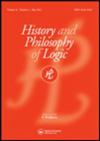Mullā Ṣadrā on Intellectual Universal
IF 0.5
3区 哲学
Q3 HISTORY & PHILOSOPHY OF SCIENCE
引用次数: 0
Abstract
Following Avicenna, many Muslim philosophers and logicians have identified ‘intellectual universal’ (kullī ʿaqlī) with the very mental concept dependent on the mind. Apart from the controversies about Platonic Forms, they argue that they cannot be the very universals in logic. Accordingly, Mullā Ṣadrā’s commentators have interpreted their view on intellectual universal in the Avicennian framework. In this interpretation, Mullā Ṣadrā has embraced Avicenna’s explanation about mind-dependent universal concepts; however, he has modified some details of the issue as per his theory of the primacy of existence and Plato’s theory of Forms. Having explained Sabzawārī and Ṭabāṭabā'ī’s interpretation of Mullā Ṣadrā’s view in his article, the author goes to propose a different interpretation according to which intellectual universals are identical with Platonic Forms, rather than the mind-dependent universal concepts. This Platonic interpretation is supported by three sets of evidences from Mullā Ṣadrā’s own texts. It also shows how Mullā Ṣadrā has answered Avicenna’s objection about the use of Platonic universal in logic.普遍的
继阿维森纳之后,许多穆斯林哲学家和逻辑学家将“智力普遍性”(kullīʿaqlī)与依赖于心智的心智概念联系起来。除了关于柏拉图形式的争论之外,他们认为柏拉图形式不可能是逻辑中的普遍性。因此,MullāṢadrā的评论者们在阿维森尼的框架下阐释了他们对知识普遍性的看法。在这种解释中,MullāṢadrā接受了阿维森纳关于依赖心智的普遍概念的解释;然而,他根据自己的存在至上论和柏拉图的形式论对这一问题的一些细节进行了修改。解释了SabzawārīandṬabāṭabā’ī对Mullā的解读Ṣ根据阿的观点,作者在文章中提出了一种不同的解释,即智力普遍性与柏拉图形式相同,而不是与心智相关的普遍概念相同。这一柏拉图式的解释得到了来自MullāṢ阿陀罗自己的文本。它还展示了MullāṢadrā回答了阿维森纳关于在逻辑中使用柏拉图普遍性的反对意见。
本文章由计算机程序翻译,如有差异,请以英文原文为准。
求助全文
约1分钟内获得全文
求助全文
来源期刊

History and Philosophy of Logic
综合性期刊-科学史与科学哲学
CiteScore
0.80
自引率
0.00%
发文量
24
审稿时长
>12 weeks
期刊介绍:
History and Philosophy of Logic contains articles, notes and book reviews dealing with the history and philosophy of logic. ’Logic’ is understood to be any volume of knowledge which was regarded as logic at the time in question. ’History’ refers back to ancient times and also to work in this century; however, the Editor will not accept articles, including review articles, on very recent work on a topic. ’Philosophy’ refers to broad and general questions: specialist articles which are now classed as ’philosophical logic’ will not be published.
The Editor will consider articles on the relationship between logic and other branches of knowledge, but the component of logic must be substantial. Topics with no temporal specification are to be interpreted both historically and philosophically. Each topic includes its own metalogic where appropriate.
 求助内容:
求助内容: 应助结果提醒方式:
应助结果提醒方式:


